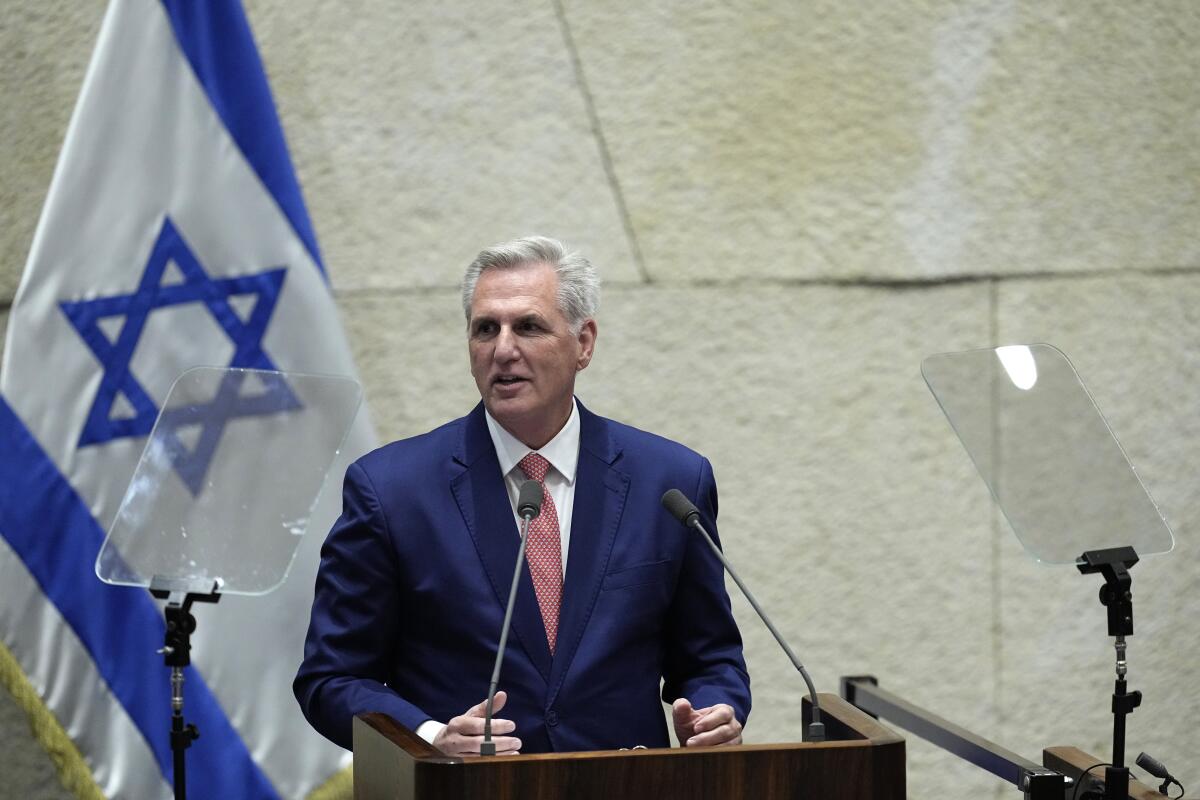News Analysis: Why Kevin McCarthy’s provocative Israel trip and invite to Netanyahu are ‘so dangerous’

- Share via
WASHINGTON — When is an invitation not just an invitation, but a defiant breach of protocol, a brash partisan move and a self-interested political tactic?
When House Speaker Kevin McCarthy travels overseas to invite an embattled, highly unpopular world leader to Washington to address Congress over the reservations of the White House, critics argue.
The Bakersfield Republican led a delegation to Israel this week, where he lavished praise on Prime Minister Benjamin Netanyahu and became only the second U.S. House speaker to deliver an address to the Knesset, Israel’s parliament, following Newt Gingrich in 1998.
Netanyahu, Israel’s longest-serving prime minister, is on trial for corruption and has embarked on plans to change his country’s judiciary and other institutions in ways many Israelis say will permanently undermine democracy. His actions have triggered massive protests across the board in Israel, drawing military officers, academics and ordinary citizens alike.
In unusual criticism, President Biden has said Netanyahu’s efforts risk violating the very values he believes the U.S. and Israel have long shared. Biden has pointedly declined to invite Netanyahu to the White House since the latter’s return to power late last year, a rarity for two such close allies.
Biden has waited “too long” to welcome Netanyahu, McCarthy said in Jerusalem. “If that doesn’t happen, I’ll invite the prime minister to come meet with the House,” he told the Netanyahu-friendly newspaper Israel Hayom, founded by Sheldon Adelson, the late American casino magnate and mega-donor to GOP and right-wing Israeli causes.
At one point, it was taboo for elected U.S. officials to travel overseas and criticize the U.S. government’s foreign policies. It’s the “never beyond the water’s edge” doctrine — say what you will at home, but not in foreign lands.
Such diplomatic rules appear to be a thing of the past.
McCarthy’s invitation to Netanyahu recalls a similar move by Republican lawmakers in 2015, when they brought the Israeli prime minister to Washington to address a joint session of Congress.
On that trip, Netanyahu pointedly skipped the White House, then occupied by President Obama, with whom relations were frosty. He used his speech to attack one of Obama’s key foreign policy initiatives — the international agreement that curtailed Iran’s nuclear activities.
But several diplomats and analysts said McCarthy’s performance is in some ways more egregious. It continues to position the GOP firmly in Netanyahu’s ever-more-controversial camp.
Israel was probably first used as a partisan wedge issue during Gingrich’s late 1990s tenure.
The trend was cemented by former President Trump, who ingratiated himself to Netanyahu and overtly favored Israel in all issues, including its longstanding conflict with the Palestinians. He moved the U.S. Embassy from Tel Aviv to Jerusalem in contravention of decades of understanding that the holy city remained a matter of dispute.
That approach was decried by numerous U.S. and Israeli diplomats and politicians.
The strength of U.S. support for Israel has traditionally been rooted in its position as a bipartisan issue. Support never wavered, regardless of who sat in the White House or which political party controlled Congress.
In his speech to the Knesset, McCarthy said he was paying homage to bipartisan support for Israel. But others saw it as the opposite.
McCarthy’s “move shows how partisan Israel has become in US politics with Rs as the Israel we love you right or wrong party,” Aaron David Miller, a veteran U.S. diplomat who worked in the Middle East for decades, said on Twitter.
“It fits ever so nicely into Republican efforts to corner the market on support for Israel and to paint Democrats as at best not committed,” Miller continued. “It’s a natural symbiosis which is why it’s so dangerous.”
McCarthy was likely trying to cater to Jewish voters in the U.S., as well as those pro-Israel members of his rebellious GOP base who have tested his tenuous grasp on power. But his calculation is off the mark, according to shifting public opinion.
Longtime, reliable U.S. supporters of Israel have increasingly turned against the current Netanyahu government, which is populated with extremist ultra-Orthodox and ultranationalist politicians. Hundreds of American Jews have held protest rallies outside Israeli diplomatic missions in numerous U.S. cities, while hundreds of thousands of Israelis have been staging regular street demonstrations in Tel Aviv since the start of the year.
Alon Pinkas, a political commentator and retired Israeli diplomat, said he doubted McCarthy’s outreach to Netanyahu would help land the prime minister an Oval Office visit. McCarthy’s “sycophantic relationship with Trump” has rendered him “a voodoo doll” for the White House and most Democrats, Pinkas wrote in the Israeli newspaper Haaretz, which is highly critical of Netanyahu.
“His pledge, or threat, to invite Netanyahu to D.C. if Biden doesn’t do so may be the Israeli premier’s desperate attempt to get himself to Washington. However, it may well end up being counterproductive,” Pinkas said. “What it does is further identify Netanyahu solely with the Republicans in direct confrontation with Biden.”
Asked about McCarthy’s Israel visit, Biden administration officials said that they were aware of the speaker’s remarks, but reiterated that no Netanyahu visit to the White House was on the books.
“Israeli leaders have a long tradition of visiting Washington,” National Security Council spokesman John F. Kirby said, noting the years of friendship Biden and Netanyahu have shared. Kirby said he expected there would be a Netanyahu visit “at some point,” but that the administration would continue “frank discussions” with Israel about the judiciary reforms and other actions that could impinge on the rights of secular Jews and minorities.
At the State Department, where criticisms of Netanyahu’s policies have been few but sharp, officials were similarly noncommittal. State Department spokesman Vedant Patel said he would not engage in “a hypothetical” when asked whether Secretary of State Antony J. Blinken would meet with Netanyahu if he were in town at McCarthy’s behest.
“We obviously remain in close touch with our Israeli partners at all levels,” Patel said. “Our relationship and our partnership with Israel is deep-rooted. ... We will continue to engage them, and I don’t have any visits or anything to preview.”
More to Read
Get the L.A. Times Politics newsletter
Deeply reported insights into legislation, politics and policy from Sacramento, Washington and beyond. In your inbox twice per week.
You may occasionally receive promotional content from the Los Angeles Times.











